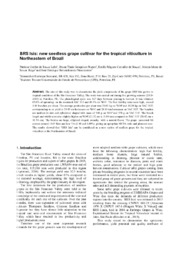BRS Isis: new seedless grape cultivar for the tropical viticulture in Northeastern of Brazil.
BRS Isis: new seedless grape cultivar for the tropical viticulture in Northeastern of Brazil.
Author(s): LEAO, P. C. de S.; NUNES, B. T. G.; SOUZA, E. M. C. de; REGO, J. I. de S.; NASCIMENTO, J. H. B. do
Summary: The aim of this study was to characterize the yield components of the grape BRS Isis grown in tropical conditions of the São Francisco Valley. The work was carried out during five growing seasons (2013-2015) in Petrolina, PE. The phenological cycle was 127 days between pruning to harvest. It was obtained 65.8% of sprouting on the rootstock IAC 313 and 60.4% on 'SO4'. The bud fertility rates were high, around 1.00 bunches per shoot. The average production per plant was 20.63 kg on 'SO4' and 18.34 kg on 'IAC 313', corresponding to an yield at 29.45 ton/ha/season on 'SO4' and 26.19 ton/ha/season on 'IAC 313'. The bunches are medium in size and cylindrical shaped with mass of 400 g on 'SO4' and 370 g on 'IAC 313'. The bunch length and width were also slightly higher on 'SO4' (21.32 cm x 11.89 cm) compared to 'IAC 313' (20.42 cm x 11.50 cm). The berries are large, elliptical shaped, crunchy with a neutral flavor. The grape presented SS content around 16.0º Brix and low TA (0.44 and 0.49%), giving an apropriate SS/TA ratio and pleasant taste. The results showed that ?BRS Isis? can be considered as a new option of seedless grape for the tropical viticulture in the Northeastern of Brazil.
Publication year: 2016
Types of publication: Journal article
Unit: Embrapa Semi-arid Region
Keywords: Grape, Uva, Uva sem semente, Vale do São Francisco, Variedade BRS Isis, Vitis Vinifera
Observation
Some of Embrapa's publications are published as ePub files. To read them, use or download one of the following free software options to your computer or mobile device. Android: Google Play Books; IOS: iBooks; Windows and Linux: Calibre.
Access other publications
Access the Agricultural Research Database (BDPA) to consult Embrapa's full library collection and records.
Visit Embrapa Bookstore to purchase books and other publications sold by Embrapa.

